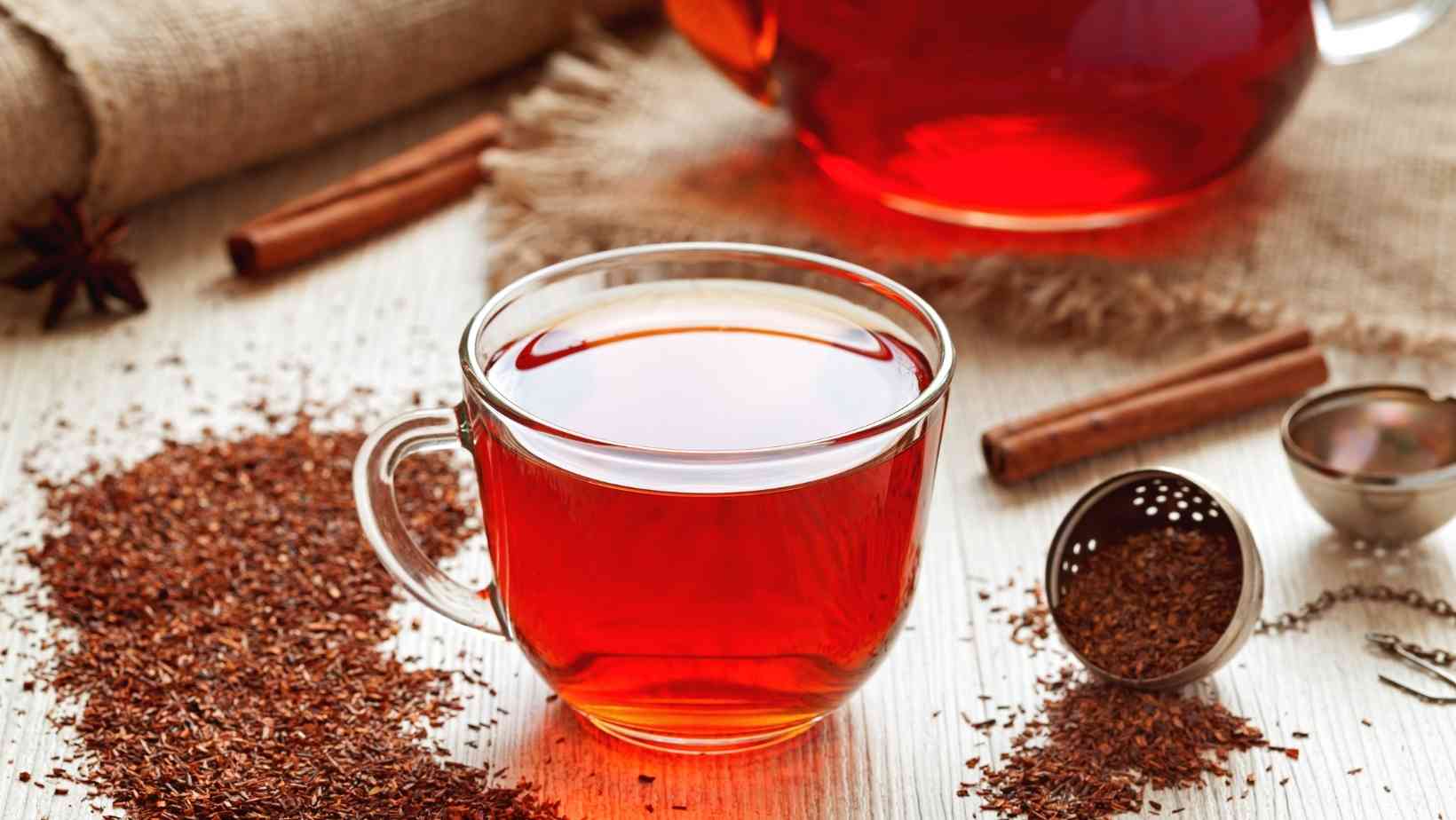Rooibos, often known as red bush, is a tisane traditionally created by fermenting the leaves of the Aspalathus linearis flowering plant. Green rooibos, which is unfermented, has a different flavour and is more expensive. Despite its lack of a relationship to classic black or green tea, rooibos is consumed in the same manner, with or without milk and sugar.

What is the history of rooibos tea?
Rooibos is a renowned South African tea that has been drunk for over 300 years in the Cederberg mountain area. Botanists first reported the plant in 1772 after drinking a sweet-tasting beverage supplied to them by the locals. The tea is created by bruising and cutting the plant's leaves and stems, fermenting them in heaps, and drying them in the sun, which gives the leaves their distinctive red-brown colour.
Since the 1930s, rooibos has been farmed and sold to over 31 nations, including the United Kingdom, Germany, China, Japan, and the United States.
What are the advantages of rooibos tea in terms of nutrition?
The major nutritional advantage of rooibos tea is its high antioxidant content, as well as the fact that it contains several unique polyphenols, such as aspalathin. These antioxidant-rich plant chemicals may help protect against free radical damage, which may lead to diabetes, heart disease, and cancer.
With the exception of fluoride and copper, the trace levels of minerals in rooibos are minuscule and will not provide much, if any, nutritional value to the ordinary user. Anecdotal accounts indicate that using the tea as a fluid replacement throughout the day may assist athletes and sportspeople maintain electrolyte levels; however, research does not support this.
The fact that rooibos is low in tannins is a remarkable feature (4.4 percent ). This makes it a suitable alternative for people who prefer a softer-tasting tea or those who have stomach issues after drinking tannin-rich beverages.
What are the top five health benefits of rooibos tea?
Jump to:
- What is the history of rooibos tea?
- What are the advantages of rooibos tea in terms of nutrition?
- 1. It has no stimulant properties
- 2. It's possible that it's good for your heart
- 3. It's possible that it'll help persons with type 2 diabetes
- 4. Bone health may be improved
- 5. Has the potential to lower cancer risk
- Is it safe to drink rooibos?
- How can I include rooibos tea into my daily routine?
- What is the best way to make rooibos tea?
1. It has no stimulant properties
Rooibos is a naturally caffeine-free beverage that may be used as a fluid substitute for individuals who don't want or can't handle the stimulating effects of caffeine. Because rooibos is inherently caffeine-free, it doesn't need to be decaffeinated, therefore its high polyphenol cotent is preserved.
2. It's possible that it's good for your heart
The angiotensin-converting enzyme (ACE), which causes blood vessels to constrict and blood pressure to increase, seems to be inhibited by rooibos consumption, which looks to lower blood pressure. Because of its anti-inflammatory and antioxidant characteristics, as well as its beneficial impact on blood lipids, particularly cholesterol, rooibos tea's high flavonoid content benefits the cardiovascular system.
3. It's possible that it'll help persons with type 2 diabetes
Drinking rooibos tea on a daily basis, which is high in beneficial plant chemicals like polyphenols, may help protect against the oxidative damage linked with diabetes. Rooibos is high in the antioxidant aspalathin, which has been shown in animal experiments to help regulate blood sugar levels and minimise insulin resistance. However, further research is required in people to corroborate these findings.
4. Bone health may be improved
Although there isn't much data, rooibos tea may help with bone health. This is because some studies have shown that it has a positive impact on osteoblasts, the cells that help create bone. Further research suggests that fermented rooibos inhibits the activity of osteoclasts, the cells that break down bone. These data point to an advantage in terms of bone strength development and maintenance. However, since there is a scarcity of evidence, further study is required.
5. Has the potential to lower cancer risk
The high antioxidant content of rooibos tea may help protect against cancer-related free radical damage. It's worth mentioning that green, unfermented rooibos contains more polyphenols than typically fermented rooibos, which explains why it has better antimutagenic properties in test-tube experiments. However, studies have yet to prove whether rooibos contains enough bioavailable antioxidants to reproduce these benefits. Future studies will hopefully determine if the antioxidant effects reported in test tubes and animal studies transfer into meaningful anti-cancer benefits in people.
Is it safe to drink rooibos?
Although additional study is required, most healthy individuals regard rooibos to be safe and without adverse effects. However, in one single instance, the person had an increase in liver enzymes after consuming significant amounts of rooibos tea. It's unclear if this individual's experience is representative of the general population, and there might have been other contributing variables at work.
Furthermore, animal research suggests a potential interaction between green rooibos tea extract and a cholesterol-lowering medicine from the statin family. If you're taking this medicine and love unfermented rooibos, talk to your doctor about it.
How can I include rooibos tea into my daily routine?
Because it has no caffeine, rooibos tea may be drunk at any time of day. If you want to cut down on your caffeine consumption, substituting a cup of rooibos for your usual caffeine shot may help you achieve your objective. This is because of its full-bodied flavour, which makes it a very gratifying caffeine substitute.
What is the best way to make rooibos tea?
Simply pour in freshly boiled water and let it steep. The stronger and more intense the flavour will be the longer you let the tea steep. Allowing the tea to steep for 10 minutes or more, according to studies, produces the most antioxidant-rich beverage.




